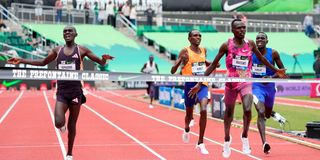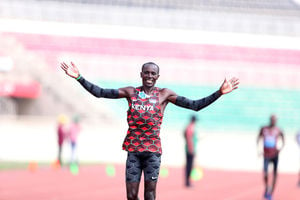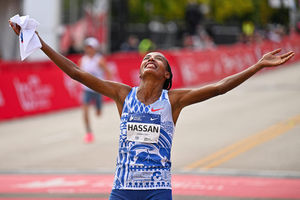
Daniel Mateiko wins men’s 10,000 metres final ahead of his fellow Kenyan Bernard Kibet on May 25 during Prefontaine Classic Diamond League meeting at Hayward Field in Eugene, Oregon, USA.
Bernard Kibet, Nicholas Kipkorir and Daniel Mateiko will be out to end Kenya’s 56-year wait for gold medal in men’s 10,000 metres at the Olympics when they line up in the final on Friday from 10pm (Kenyan time).
The late Naftali Temu was the last Kenyan to have won Olympics gold medal when he triumphed at the 1968 Olympics in Mexico. On that cold Sunday evening on October 13, 56 years ago, 37 runners lined up at the Olympic Stadium in Mexico City for the only final race of the day, the men’s 10,000 metres.
Some of the finest distance runners in the world then, notably from the United States of America, Britain, Australia and New Zealand which were the superpowers of distance running until that fateful day, line up in the final.
Many lived at sea level, few at altitude. The rarefied air of Cuidad de Mexico, at an elevation of 2,240 metres above sea level, compared well with the 2,500m altitude of the Kenyan highlands.
At the starting line-up were two young Kenyans; 23-year-old Naftali Temu who passed on March 10, 2003, and 27-year-old Kipchoge Keino.
They found the weather ideal, having conditioned for the Mexico Olympics in Nyahururu under their agemate, coach Charles Mukora, who had taken up coaching earlier that year after returning home as a graduate of sports science from Loughborough University in Britain.
Like all long distance running events, the race was plain running at the start until Hungarian Janos Szerenyi hit the front and remained unshaken for the next five laps before Russian Nikolay Sviridov assumed control of the pace which was at this stage the slowest since 1924 Olympics because of the attitude factor in Cuidad de Mexico.
The game plan changed dramatically with world record holder and the best distance runner of that time, Ron Clarke of Australia, stepping forward. He would later realise it was a big mistake.
The Australian was born at sea level. He would rue his decision which almost took him to the hospital at the end while trying to remain in touch with the highlanders. Would he survive and take control of the situation? Time would tell.
He was still with the leaders until the 19th lap when the stadium exploded after Mexican Juan Martinez zapped ahead.
But in their reverie, they failed to notice a small built dark-complexioned black runner join the fray in close tag with Mamo Wolde of Ethiopia, Tunisia’s Mohamad Gammoudi, a silver medallist in Rome four years earlier, Sviridov, Clarke and Keino.
The race remained open until the penultimate lap when Temu, who was an army officer, and Wolde pulled ahead, having dropped Gammoudi and Clarke. Keino had already retired with a stomach cramp. At the bell, Wolde shifted gear and opened up marginally.
But Temu refused to be shrugged off. Instead, he kept within striking distance, levelling on the home straight before unleashing a deadly kick to take Kenya’s first-ever gold medal in a time of 29 minutes, 27.40 seconds, with a gap of four metres to spare.
History was made, and it remains just that, a footnote in the history books. Kenya's first ever Olympic Games gold medal and the last in the men’s 10,000m, a dubious streak which has outlasted five presidents and a millennium.
Kibet, Kipkorir and Matieko will today try again to bring this medal home five and half decades later. A succession of runners have tried in vain but one has even gone to the limit and missed this gold medal by the thickness of a running vest, Paul Tergat, twice Olympics silver medalist, twice world championships silver medalists, and five-time world cross country champion.
But for all his effort, Tergat, who has said he will set aside every other engagement as the President of the National Olympic Committee of Kenya (NOC-K) on Friday to cheer the Kenyans who he believes can break this losing streak, the longest in Kenya's impressive distance running history.
"Each edition of the Games comes with its own dynamics, and you don’t have any control of the next one, so I treat my planning training and commitment wholeheartedly as though that would be the last opportunity," said Tergat who made his international debut in the 1992 Boston World Cross Country Championships, and exited at the scene in 2004 Athens Olympic Games.
Tergat would have easily won the 10,000 title at the 2000 Sydney Olympics against his great rival, Haile Gebrselassie, who had previously denied him the gold medal at the 1996 Atlanta Olympics.
"About Sydney 2000, this is one race I truly came very close to winning, losing by the smallest of time margins," Tergat told Nation Sport on Wednesday from Paris.
"The Olympic Games happen once every four years, and my preparation for such an event lasted a four-year cycle for me to be at top fitness.
"I never took any chances with any of the competitions. My preparations for Sydney were as rigorous as the others.
"My preparation for every edition of the Olympic Games, and with regard to the other two games were very similar in terms of approach. I always gave my very best, be it mental involvement, physical, name it. I can say that I put in a lot of hard work in all my career events, the only difference being the uniqueness of the venue of competition where adjustments of training regime may apply," recalled Tergat.
"Our young men going to compete in the 10,000m in Paris should know that this is their moment. They have trained, dreamt of victory, and looked forward to this day.
"The stage is theirs, representing millions of fellow countrymen and women who will be watching from home, plus other fans across the globe. They are the pride of the country. Everyone, me included, is wishing them success. They just need to approach the race as a team. Team work is the key ingredient," said Tergat, a former basketballer in his youth.
Tergat ended his national duty career at the 2004 Athens Olympics, but that day was not his. He trained so hard prior to the Olympics with a group of young and seasoned runners secretly on Magadi Road behind Ngong Hills.
He trained between Ole Polos which is at an elevation of over 2,000 metres above sea level, and very cold and extremely hot Ole Tepesi (1,000m) for months.
"The marathon is always a tough race. In my training, I would clock upwards of 300 kilometres a week. Like anything else, you may be at your best, like I was, but things just don’t turn out as planned on race day. What I know is, I gave the best of my ability to the event, I trained very hard but it was simply a bad day in office for me.
"All in all, I have no regrets at all, knowing what I put in every effort. You see, once you are in a race, there is no shortcut. From all of you starting, one person will win it . So give your best and accept the results."
Tergat is confident most Kenyans run clean. He always encourages young Kenyans to run clean.
"I have no kind words for drug cheats. In sports globally, cheating is not anything we want to see anywhere. There are no shortcuts in life. Please work hard, although this may take long to reach your destination, it is worth waiting for and sacrificing more to arrive.
“Contrary to what many imagine, sport is one of the best things that breeds friendships after an intense rivalry. I remember 2000 Sydney Olympics as such a wonderful day. I gave the very best, and every bit of effort from me to win but lost to a better athlete at the wire.
“I was very happy for myself and more so, for my worthy opponent and great friend, Haile, for his gallant last dash push to grab the gold,” Tergat, who battled the Ethiopians twice at the Olympics, and three times at the World Athletics Championships, remembers.
This competition inspired Hollywood to produce "Endurance" movie based on a young African boy who overcame the odds to excel in sports. The producer wanted Tergat to win and star in the picture, which went to Ethiopia anyway.
Tergat is one of the long distance running legends Kenya has produced, and it was in cross country that his success story really began.
The first of his five individual world cross-country crowns was claimed in Durham in 1995, and he would go on to gain gold at the next four editions – in Stellenbosch in 1996, Turin in 1997, Marrakech in 1998 and Belfast in 1999.
“As always, I like saying Belfast was ‘the toughest yet, but the best in my career.
“During my racing days on the cross country, Belfast stands out in terms of its tough conditions that day at the Barnett Demesne playing fields of Queens University.
“We all battled in the muddy course with all its turns and twists but I was eventually rewarded with another world title to make it five straight Senior Men’s world cross titles in a row, and that was truly special. My country equally picked up her 14th successive team title.
“Cross Country is always a tough event on any given day. Indeed, every sports competition is never easy and this is even tougher for cross country. Cross country does not have a standard course like the track and, therefore, no one may predict precisely how the next one will turn out to be."
The singlet he wore when winning in Turin in 1997 is on display in the Museum of World Athletics as his best.
His rise to the top was a classic example of determination for three years at the Kenya Armed Forces residential training camp in Kibiku, Ngong, and 27km south of the capital Nairobi. He was the slowest amongst giants of cross country, and as he once told me that he was always the last to return to camp during morning runs.
“I set my standard to close the gap,” he once said.
Tergat would have become world champion in 1992 but an injury in Boston ruled him out of competition. This was followed by two years of trials.
Tergat took everything thrown to him _ from track to the road, winning Cross country running, paved multiple world records, two world half marathon titles, two Olympic 10,000m silver medals, and three 10,000m medals – two silvers and a bronze – at the World Championships.
Tergat is one of the few former sports persons who transcended from action to management with ease, and he is regarded as one of the most influential sports personalities in the world.
“Because of my love for the sport, I have taken all opportunities both to learn and apply towards making an impact within it. I was an active athlete but with a higher goal and desire to transition to the next level of administration in a sports environment,” he said.
“So, whenever I look back on the journey from cross country running with all its thrill and adrenaline, to the marathon with all the highs and lows, I find fulfilment that I am still within something I love most- sports.”







